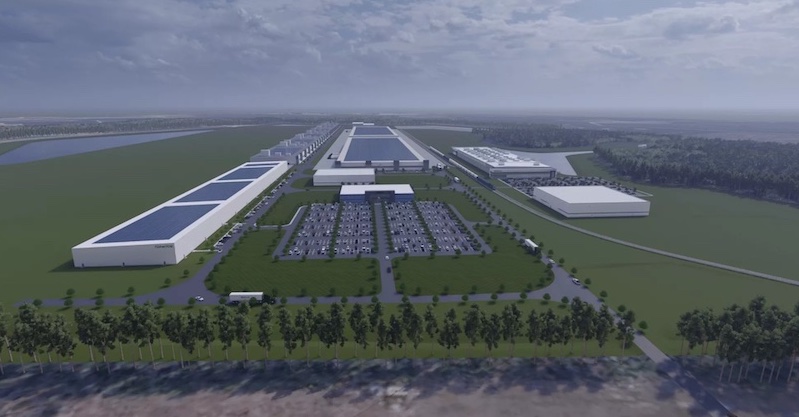Redwood Materials visits SC — the latest on its $3.5B Berkeley County project
By Christmas, Redwood Materials, a producer and recycler of anode and cathode battery components for electric vehicles, expects to be operating out of its 600-acre site at Camp Hall Commerce Park in Ridgeville.
“We are very much ‘building the plane as we fly it,’ which means building smaller buildings, getting production up and going while we’re building other multimillion square foot (sized) facilities so we can scale and grow into those,” said Alexis Georgeson, vice president of communications and government relations for Redwood Materials at a Feb. 15 breakfast hosted by the Berkeley County Chamber of Commerce.
In late 2022, Nevada-based Redwood Materials — founded by Tesla co-founder JB Straubel —announced its $3.5 billion investment to establish operations in Berkeley County, marking the largest economic development announcement in the history of South Carolina. The company expects to create 1,500 new jobs over the next 10 years.
“Research and development a big part of our focus and there will be a lot of that happening at the Berkeley campus. We hope to be working very closely with ReadySC on a lot of worker training,” Georgeson told a packed house at the South Carolina Aeronautical Training Center at Trident Technical College.
Redwood Materials, created in 2017, is the first company in the world that recycles used electric vehicle batteries and other types of batteries to extract crucial components that can then be sent to car manufacturers to be put into new electric vehicle batteries. Currently, those components exclusively come from Asia.
“Our business model is a little bit different than some other battery recyclers (in that) they’re not going further downstream and doing the refining. Unless you’re going further into the refining process, you’re actually having to export the material and relying on another country to refine it for you,” Georgeson said. “We feel the pressure every single day to get up and going as quickly as possible and be able to feed (automakers) these components domestically. They don’t have any plans other than to send $150 billion overseas to Asia right now to source these components.”
Redwood Materials works with auto dismantlers to source used and end-of-life electric vehicle batteries, either when a car reaches the end of its life or was crashed and no longer drivable, Georgeson said.
“Until now, (dismantlers) haven’t had a downstream plan for these batteries. They’ve pretty much been just storing them and waiting for someone like Redwood to come along and take these batteries off their hands,” Georgeson said. “We go into the field, we send our own fleet of trucks and collect these thousand-pound batteries safely, package them and transport them.”
One of Redwood Materials’ largest customers is Panasonic, which manufactures Tesla electric vehicles at Tesla’s gigafactory. Panasonic will be sourcing both anode and cathode battery components from Redwood.
“The beauty of these (components) is that they can be infinitely recycled,” Georgeson said. “At a certain point where our population starts (swapping) an internal combustion engine for an electric vehicle — and if you believe that at some point, we will all be driving electric vehicles — we can hit a plateau where we’re recycling one vehicle to create a new vehicle and we’re no longer having to mine these materials (from the Earth). That’s really a future that we firmly believe is not too far off.”
Georgeson said Redwood Materials is continuously looking to streamline operations and open up new recycling avenues and opportunities—including a direct consumer recycling program for household electronics.
“We send graphite recovered in our mining process downstream for industrial lubrication. We’ve got gypsum as part of our downstream product and we send that to drywall manufacturers,” Georgeson said. “Everything that’s recovered in the process is reused or sent to another partner that needs it in their process. In terms of rail and trucking, we anticipate using rail very heavily on the (Camp Hall) site.”
Since recycling is the hallmark of the company, the Berkeley County facility will use renewable energy to power its operations and water used in its hydro operations will be continuously recycled.
“Our facility in Nevada, as well as the one in Berkeley County, will use one hundred percent renewable energy and have no wastewater,” Georgeson said. “Our Nevada facility took twelve months from breaking ground to products coming out of the facility. We move fast. The ability to get going on the Camp Hall site very quickly was a critical factor for us, as well as being located in a great central downtown where we knew we’d be able to recruit and retain talent.”

